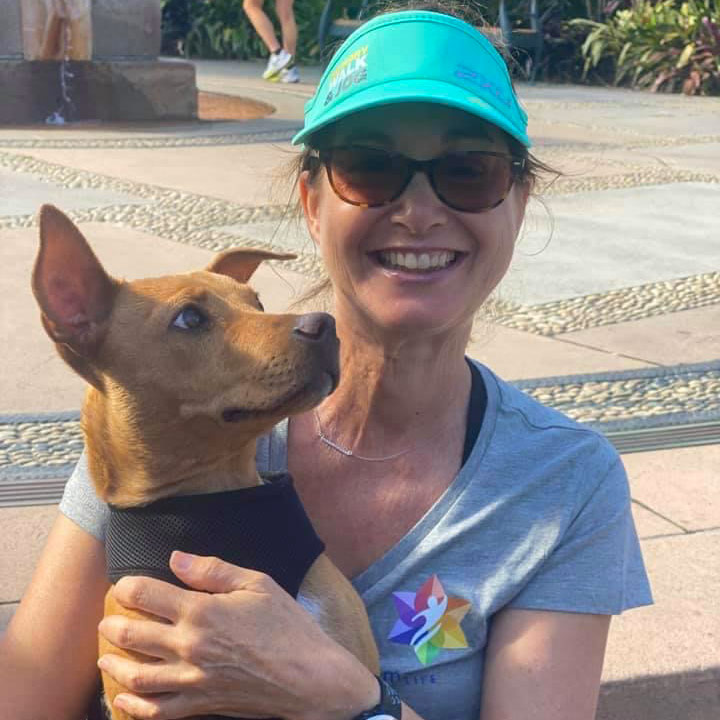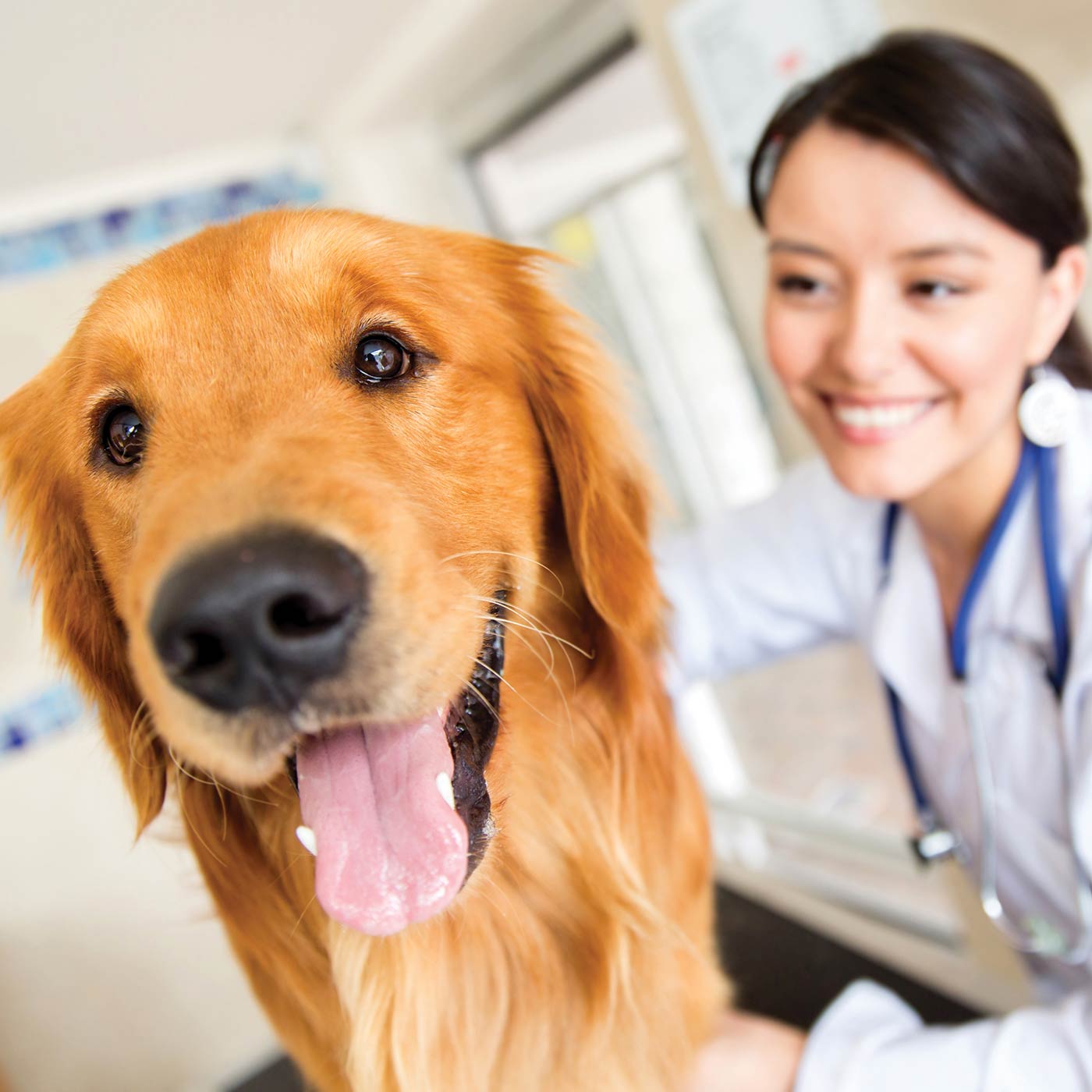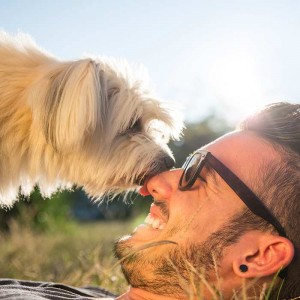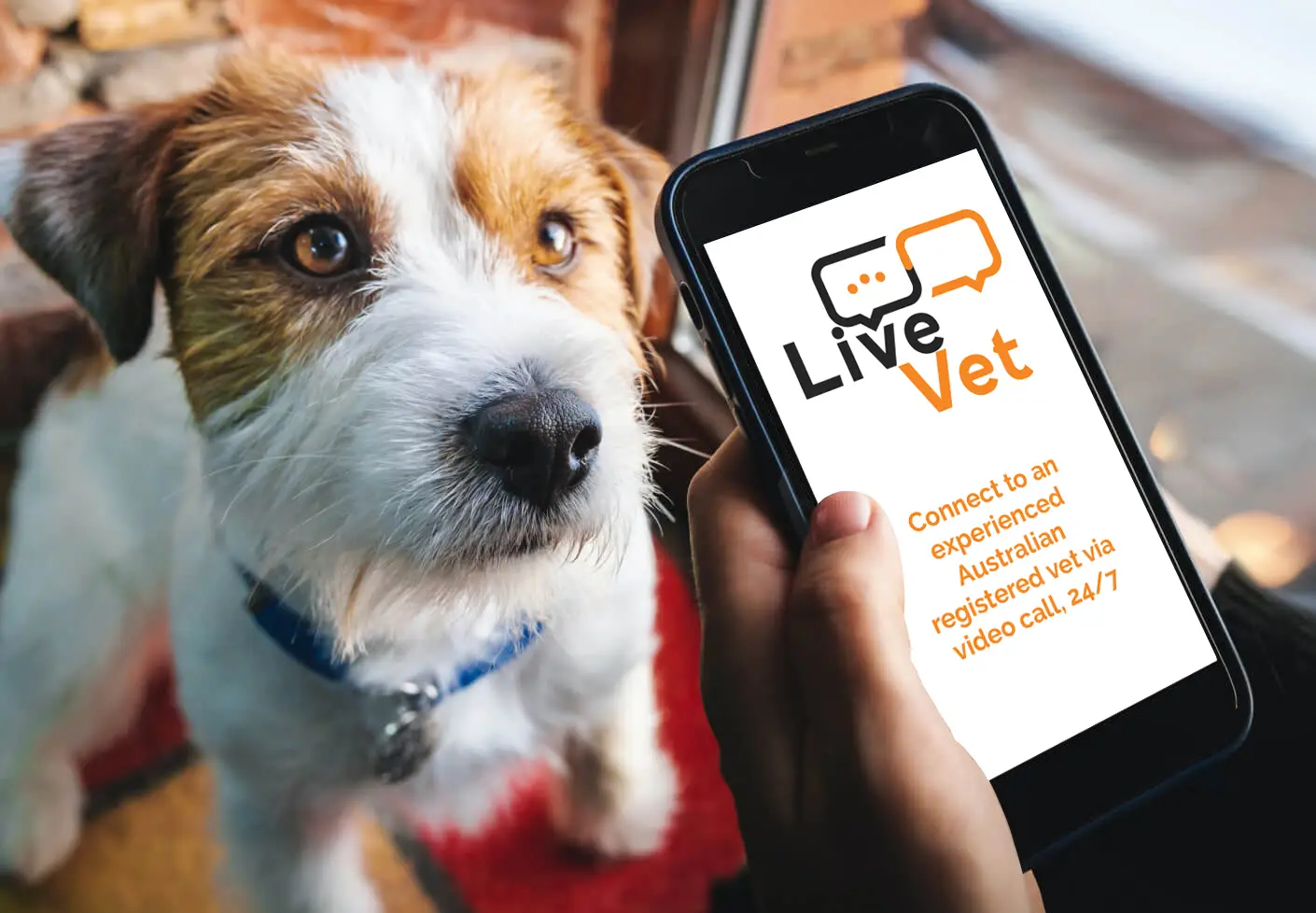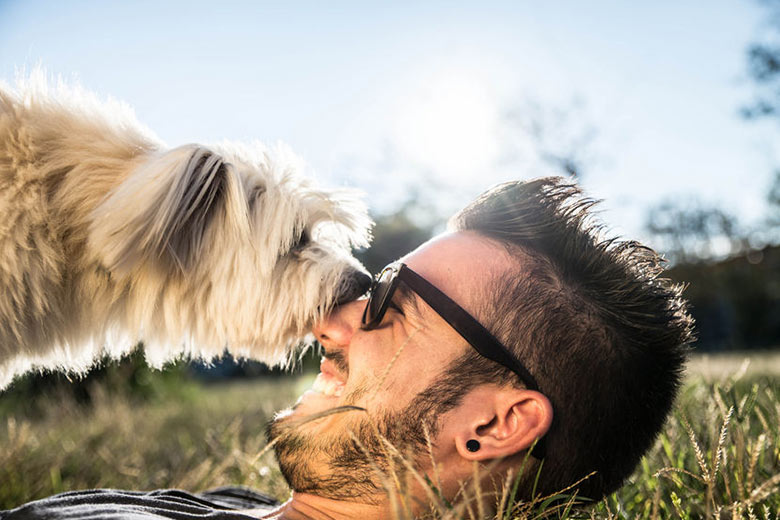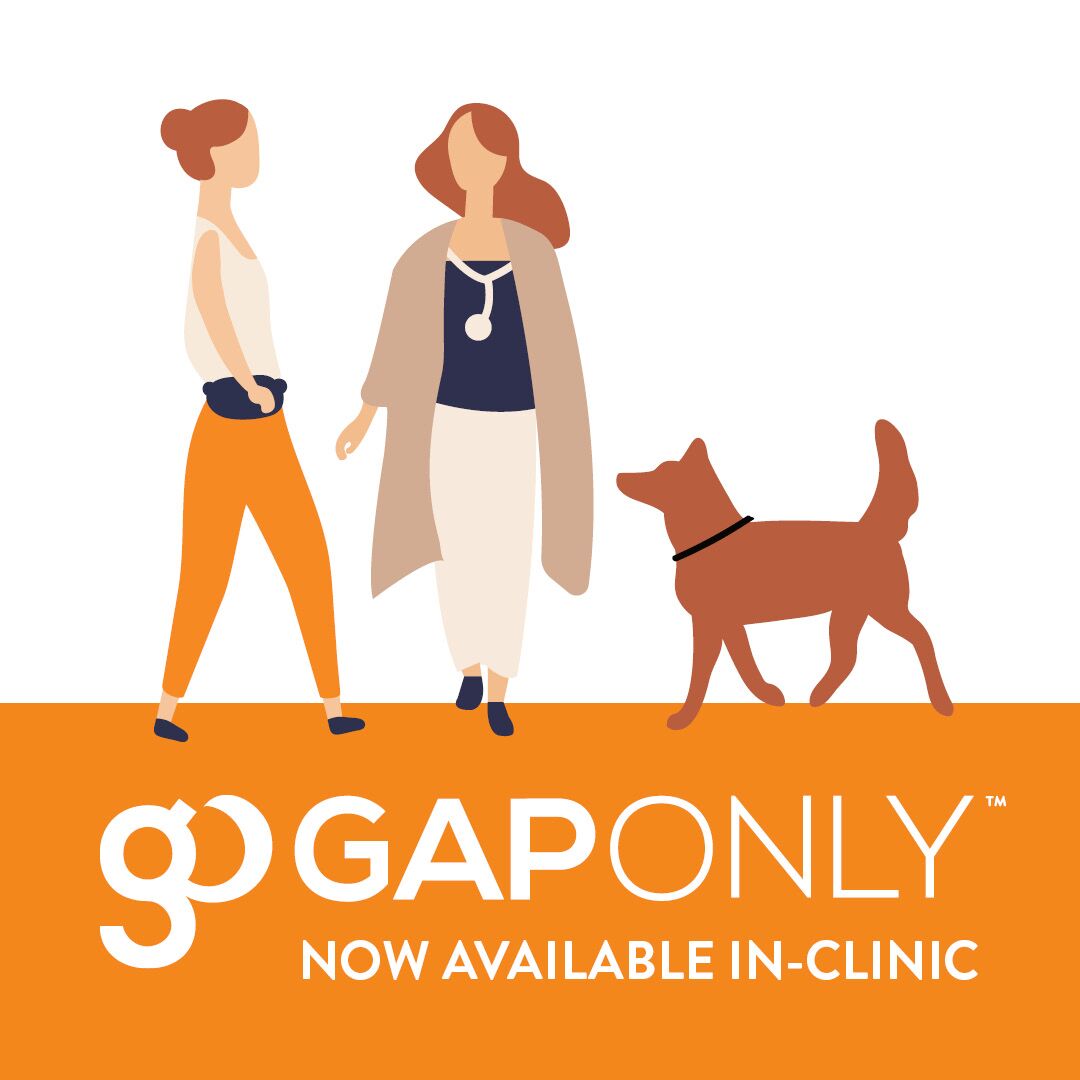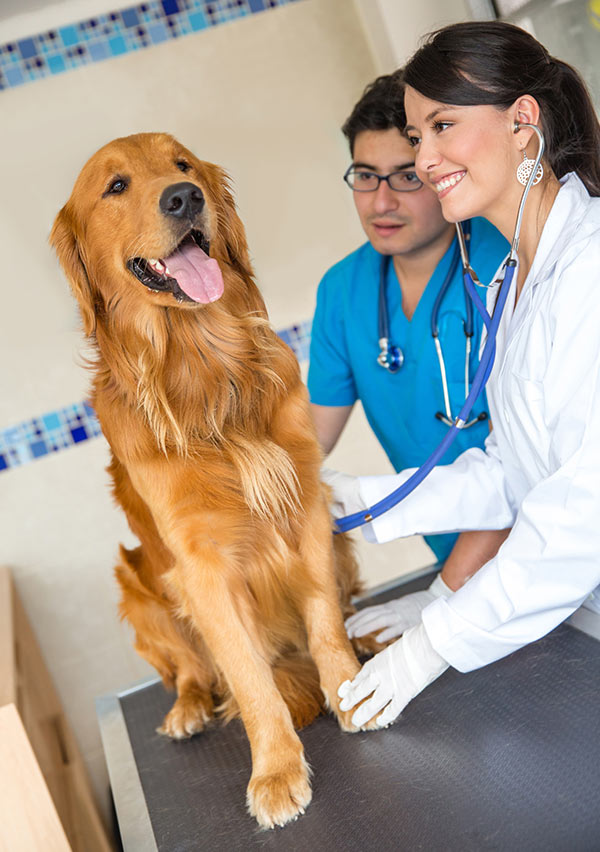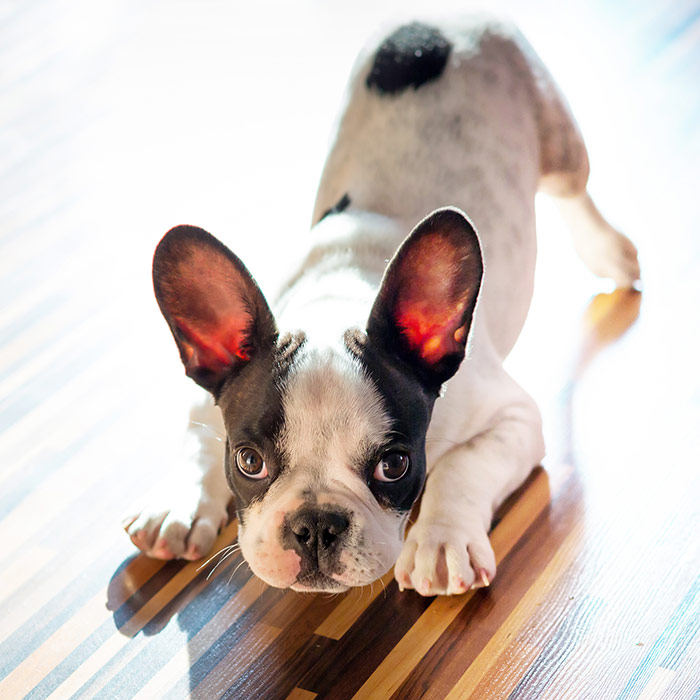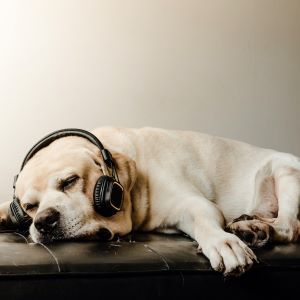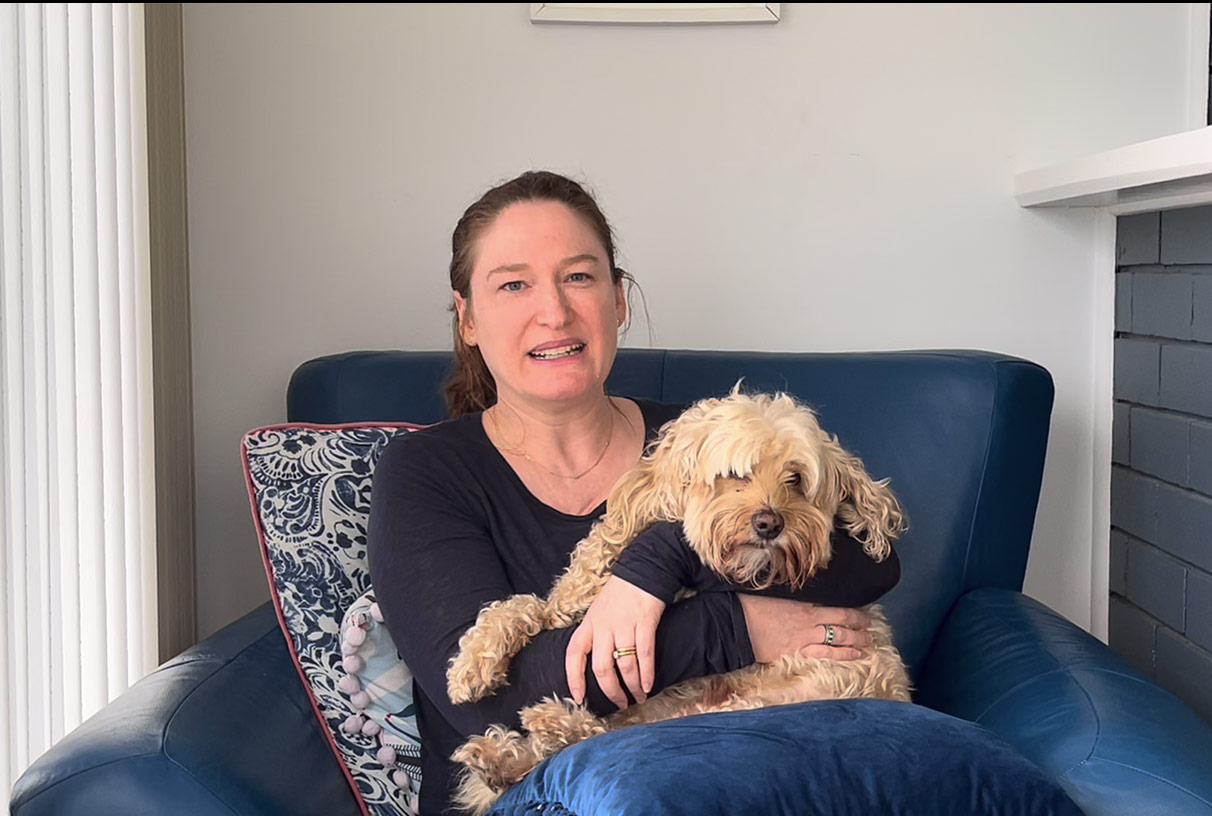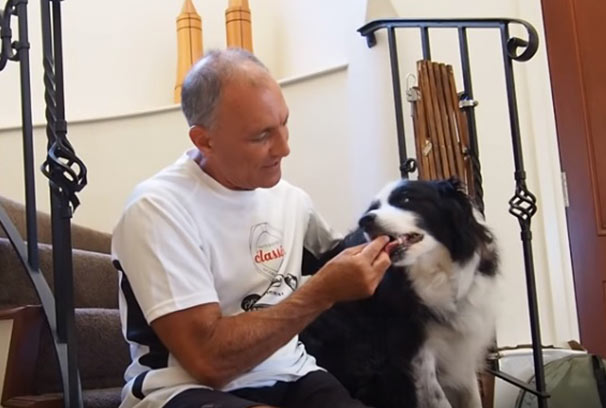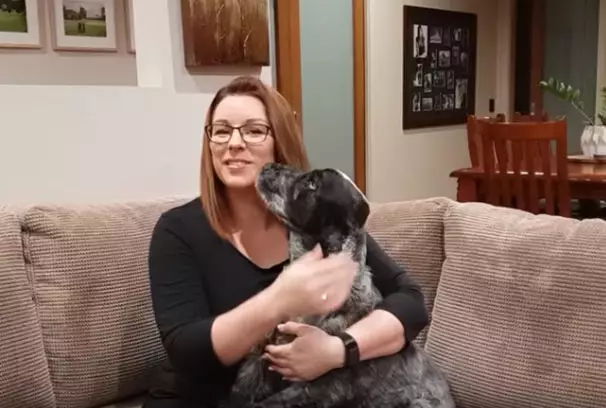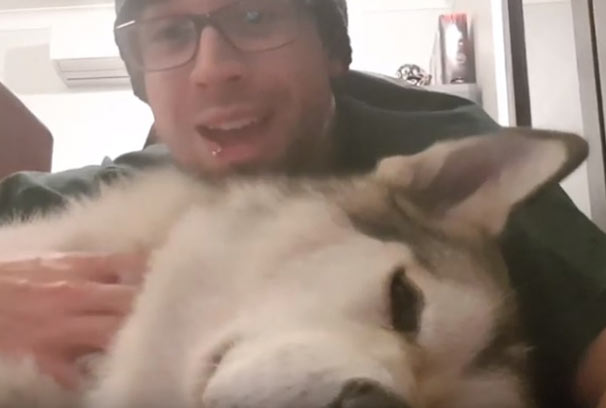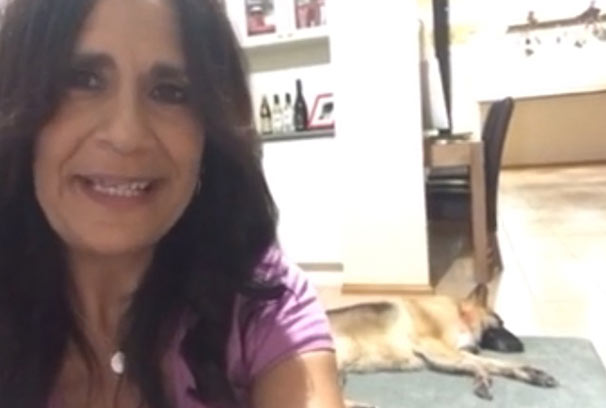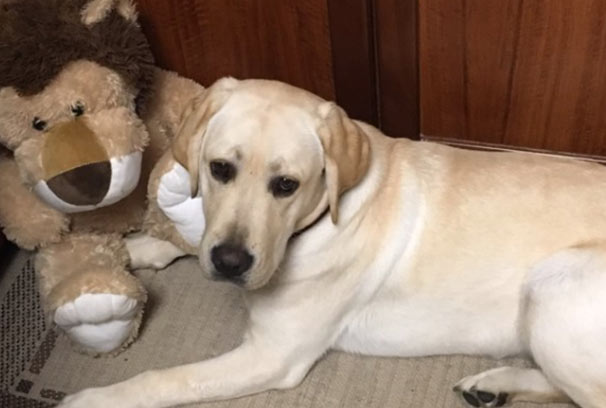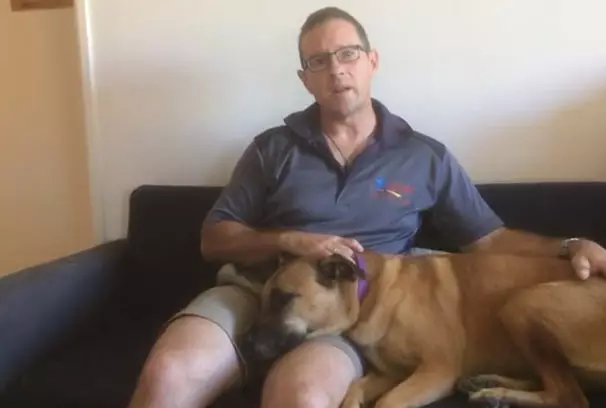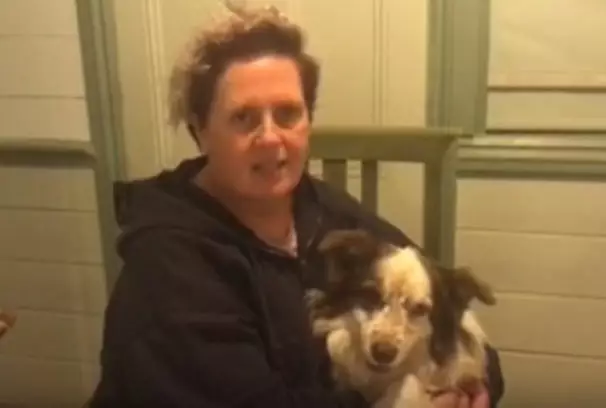Why does my dog lick me? Understanding canine affection
Some canine behaviours are a real mystery to us humans. For example, why do they roll in foul smelling things, like dead birds or duck poo? Or eat strange things like grass, or even poop? Many a puzzled pooch parent has wondered why our puppies love to stare at us excessively, follow us everywhere we go, or lick our faces or feet.
In our new series on Understanding Canine Behaviour, we unravel these and other weird and wacky things our dogs may do.
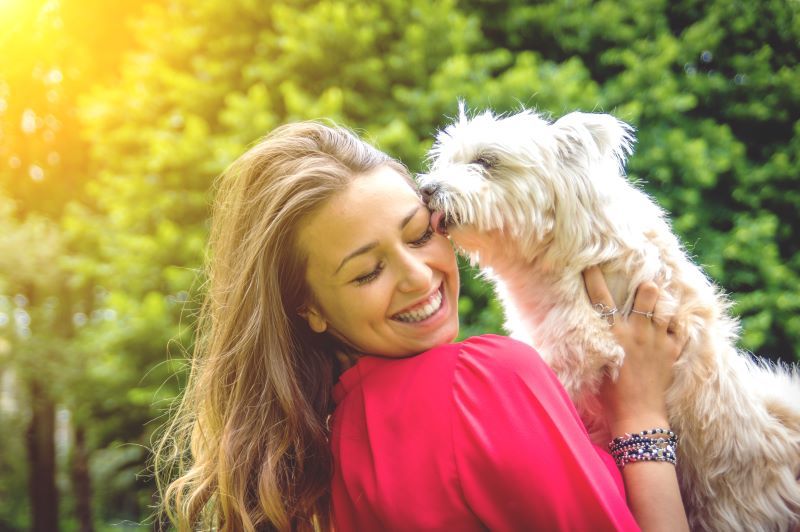
Licking – a common dog behaviour
It’s no wonder our dogs lick us – on our faces, hands, feet, ears or wherever they can reach. We might think it’s strange, but licking is a natural behaviour for dogs.
 Mama dogs lick their newborn puppies right after birth and in the days and weeks afterwards, to clean them, comfort them and encourage them to toilet. Young puppies lick themselves and their siblings to groom and bond with each other, and they lick mum to tell her that they are hungry or need attention. Licking behaviour is also a way for both mum and puppy to express their affection for one another.
Mama dogs lick their newborn puppies right after birth and in the days and weeks afterwards, to clean them, comfort them and encourage them to toilet. Young puppies lick themselves and their siblings to groom and bond with each other, and they lick mum to tell her that they are hungry or need attention. Licking behaviour is also a way for both mum and puppy to express their affection for one another.
Regardless whether its instinctive or learned behaviour, the urge to lick in different situations and for different reasons stays with dogs throughout their lives.
Different reasons why dogs lick their owners
Affection and bonding
Dogs are loving and affectionate creatures, so when your pooch licks you, there’s a good chance they are showing you some affection.
Just as they did with their mama and siblings in early puppyhood, dogs continue to express their feelings of attachment with a lick, or two, or three… Only now that they are living with their human families, it’s we who are the recipients of those slobberly kisses!
Licking us is just one of many ways our dogs may use to show us their affection. Think of it as the canine equivalent of a kiss. Other behaviours they use that express social bonding include cuddling, nuzzling, nosing and even sitting on us.
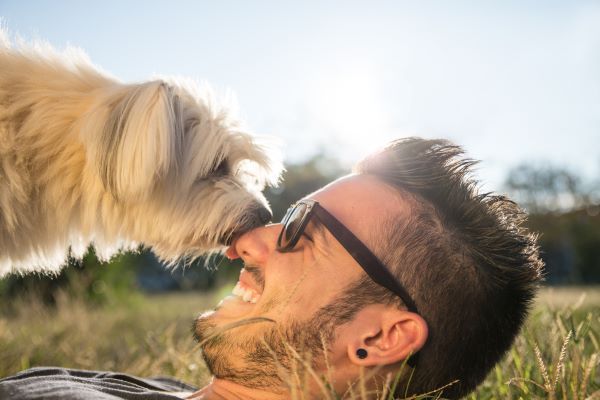
Licking plays an important role in how dogs bond with others. Just as it feels good for us to stroke a dog, it probably feels good to dogs to lick the ones they love.
In fact, studies have shown that licking releases endorphins in a dog’s brain. Endorphins are neurotransmitters that make dogs – and us – feel happier, calmer and more relaxed. This leads to a release of dopamine, another neurotransmitter that is associated with pleasure and motivation.
- Does your dog love you? Take our quiz to find out!
- Want to know more about dog insurance? Learn more here.
Communication
Licking is a means for dogs to express themselves and plays a prominent role in canine communication. For example, some wild species of dog will lick pack members in order to welcome them home.
So it’s logical to assume that our dogs are often trying to tell us something with a lick, and it’s not always “I love you, my beautiful human“.
Other messages our dogs might be conveying with a lick include:
- “Hi, I’m so happy to see you!” Many dogs greet their pet parent with a lick when they come home or wake up up the morning. Super-friendly dogs may even greet strangers this way!
- “I want you to feel better“. For dogs, licking is sometimes a comforting behaviour. If your dog is concerned about you, they may try and lick you to show empathy. Researchers in a 2012 study asked dog owners to pretend to cry and found that their poochess were more likely to lick them than when their owners were just humming or talking.
- “I’m hungry“. In the wild, young dogs may lick their mother’s lips when she returns from a hunt to tell her that they’re hungry. This instinct may have carried into your dog’s behaviour and they may lick you to let you know they’re ready for dinner.
- “I don’t want to fight..” Licking can be a pacifying or peacemaking signal. If your dog knows your angry with them, they might come give you a lick to kiss and make up.
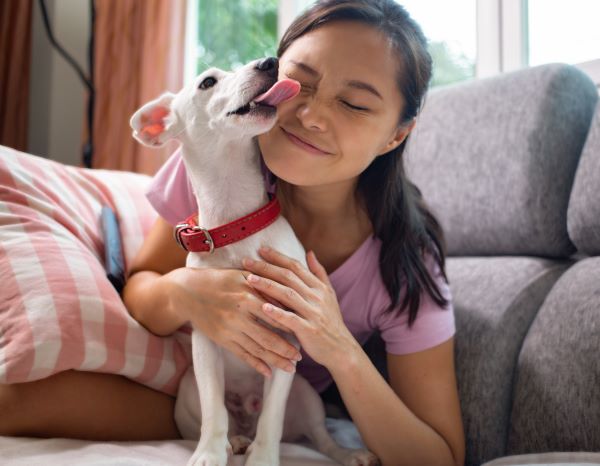
Seeking attention
 Licking us is a great way for our dogs to get our attention. When your dog licks you, you are more likely than not to smile, laugh, make a loving comment, stroke them, pet them or fuss over them. This rewards and reinforces licking behaviour, making them more likely to repeat it.
Licking us is a great way for our dogs to get our attention. When your dog licks you, you are more likely than not to smile, laugh, make a loving comment, stroke them, pet them or fuss over them. This rewards and reinforces licking behaviour, making them more likely to repeat it.
Note that even if your reaction to your dog’s licking you is negative, such as pushing them away or telling them to stop, you are still paying them attention. This type of attention can backfire and encourage licking to continue.
Taste and curiosity
Does your dog seem to lick you more after you’ve exercised? It may be because you’re nice and sweaty. Our sweat contains salt and acidic chemicals that may taste delicious to our dogs.
Your dog may also lick your face or hands after you’ve eaten because they can smell the delicious food on you, or after you’ve applied moisturising cream with an interesting smell. (Be aware that some medications and lotions, such as psoriasis creams, can be poisonous to dogs, so don’t let your dog lick you after you’ve applied these.)
Or, your dog may lick you simply because they want to find out what you taste like. After all, licking is a way for your dog to explore the world, and you are a very important part of that world!
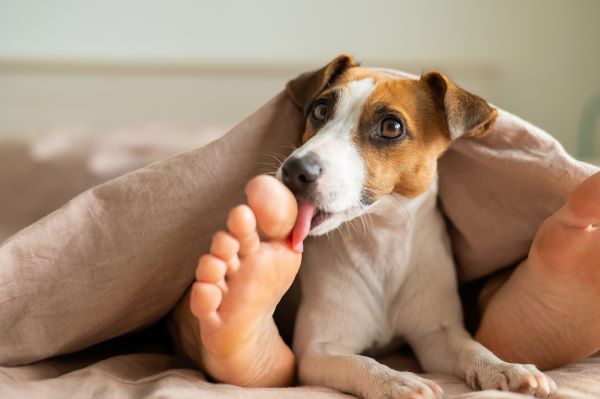
Security and comfort
For dogs, licking can be a soothing behaviour that helps them feel calmer and more relaxed. If they’re feeling anxious or stressed, then licking you, or themselves, can provide a sense of security and comfort, similar to their experience as young pups when licked by their mother.
Responding to your dog’s licks
If you don’t mind your pooch licking you, or if you’d like more of it, respond with pats, praise or other positive reinforcement.
If you don’t want to be licked on the lips, turn or raise your head when your dog comes in for a lick so that your cheek, neck or preferred body part is on the receiving end instead.
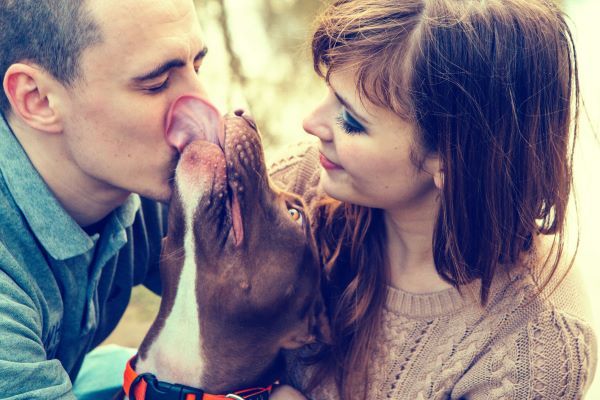
If you don’t want to be licked at all, and prefer your dog to cuddle or lie close to you instead, ignore them completely when they lick you. Only engage with them when they sit or lie at your side without licking you, preferably by showering them with praise.
Recognizing when licking becomes problematic
Some dogs lick a lot, and some only occasionally, but if your dog suddenly starts licking you or themself much more frequently than usual, it could be a sign that something is going on.
Although rare, dogs can lick excessively because they have developed an obsessive-compulsive disorder caused by prolonged stress and anxiety. More often, dogs lick more frequently if they have a health issue such as an allergy, injury or arthritis.
If you’re concerned about your dog’s licking, contact your vet or an animal behaviourist.
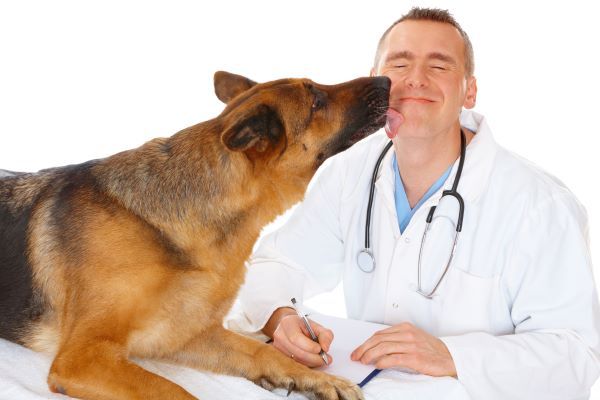
Unsure how serious it is?
Bow Wow Meow policyholders can get access to trusted vet care anytime, anywhere, at no additional cost. Connect to an experienced Australian registered vet via video call, 24/7. Whether it’s providing vet advice, setting up at-home treatment plans, or confirming if you need to visit a vet in person, you can get help when you need it.
Find out more about our pet insurance cover options.
Setting boundaries and training alternatives
If your dog’s constant licking is becoming too much, and there isn’t an underlying health issue causing it, it’s time to implement some changes.
Withdraw your attention
Getting your dog to stop licking you can be achieved by denying attention when they do it. Instead of giving either positive or negative attention, remain neutral while moving the body part that’s being licked away from your dog. Avoid saying anything or making eye contact.
If this doesn’t stop your dog, try moving away from your dog, or leaving the room entirely. With constant repetition, they should get the message that their licking is not something you enjoy.
Redirect their licking
An alternate approach is to give the dog something else to do that stops them licking, such as a chew toy or a food puzzle. Or, you can get them something more suitable to lick. “Lick mats” are a great option for this, as they direct your pup’s desire to lick in a positive, non-destructive and non- irritating way. All you need to do is smear some dog-safe peanut butter, plain yogurt or wet food on the lick mat for a satisfying treat or meal.
You could also try training them to carry out a new command or trick, such as giving you their paw or rolling over, which will redirect their licking and reward them with your affection and attention.
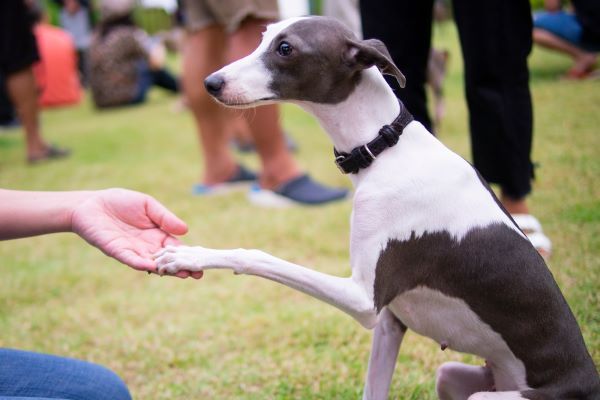
It’s also really helpful to keep your dog stimulated and give them plenty of exercise, which will reduce any stress or burn up any excess energy that might be directed towards licking you.
Strengthening the bond with positive reinforcement
Be sure to give your dog lots of positive reinforcement through praise and attention when they’re doing what you want them to, rather than giving them negative attention (punishing or scolding them) when they’re not.
The important thing is to be consistent; if you give your dog mixed messages, it will just confuse them.
FAQ’s
Why does my dog lick me excessively?
There are a number of reasons why your dog may lick you excessively. Sometimes it’s a sign that your dog is anxious, bored, suffering from a health condition or in pain. If you’re concerned about your dog’s excessive licking, speak to a vet or animal behaviourist for advice.
Is it safe for my dog to lick me?
Yes, it’s usually relatively harmless when your dog licks you. However, be aware that dogs’ mouths contain a lot of natural bacteria, which generally won’t cause harm unless it gets into an open wound.
How can I discourage my dog from licking me?
Licking is a perfectly natural behaviour and is a useful way for dogs to express themselves. If you have a licker it’s important that you try to understand why your dog is licking you. Then you can try to address the underlying cause, whether it’s boredom, stress or just your dog’s way of showing how much they love you.
What if my dog doesn’t lick me at all?
Some dogs may exhibit occasional licking and some may not lick at all. This does not necessarily mean a dog is less communicative or affectionate. They might have just learned alternate ways to express themselves as a puppy or they simply don’t enjoy licking.
Are there any health concerns related to excessive licking?
If your dog has suddenly started licking you or themself excessively, you should talk to your vet to get them checked out. Exessive licking can be a sign that they are stressed or anxious, or that they are in pain, uncomfortable or itchy. Licking is soothing to dogs and they may be licking themselves to help them feel better. However, they can sometimes lick themselves so much that they damage their skin.
Bow Wow Meow Pet Insurance can help protect you and your dog should an unexpected trip to the vet occur.
-
Find out more about our dog insurance options
-
Get an online pet insurance quote
Bow Wow Meow is proud to have been awarded winner of Canstar’s ‘Most Satisfied Customers’ Award in the Pet Insurance category for both 2024 and 2025!
Bow Wow Meow is proud to have been chosen as Product Review’s Pet Insurance Award Winner every year from 2018 to 2025! This is based on 2,995 independent customer reviews (as at 21/01/2025), with an overall rating of 4.3*
Google Review rating = 4.5* (based on 968 reviews)
Trust Pilot rating = 4.6* (based on 531 reviews)
Bow Wow Meow is proud to have been chosen as Product Review’s Pet Insurance Award Winner every year from 2018 to 2025! This is based on 2,995 independent customer reviews (as at 21/01/2025), with an overall rating of 4.3*
Google Review rating = 4.5* (based on 968 reviews)
Trust Pilot rating = 4.6* (based on 531 reviews)
Bow Wow Meow has been chosen as a winner in the Finder Pet Insurance Awards 2024. Finder’s panel of experts analysed over 140 quotes to award our Ultimate Care Plan the winner of the “Pet Insurance – Value” category.

